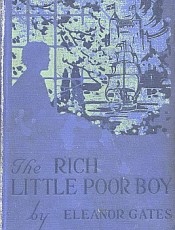it was new year's eve.
all the day had endured that sombre sky which is so often the sky of the basque country—and which harmonizes well with the harsh mountains, with the roar of the sea, wicked, in the depths of the bay of biscay.
in the twilight of this last day of the year, at the hour when the fires retain the men around the hearths scattered in the country, at the hour when home is desirable and delicious, ramuntcho and his mother were preparing to sit at the supper table, when there was a discreet knock at the door.
the man who was coming to them from the night of the exterior, at the first aspect seemed unknown to them; only when he told his name (jose bidegarray, of hasparitz) they recalled the sailor who had gone several years ago to america.
“here,” he said, after accepting a chair, “here is the message which i have been asked to bring to you. once, at rosario in uruguay, as i was talking on the docks with several other basque immigrants there, a man, who might have been fifty years old, having heard me speak of etchezar, came to me.
“'do you come from etchezar?' he asked.
“'no,' i replied, 'but i come from hasparitz, which is not far from etchezar.'
“then he put questions to me about all your family. i said:
“'the old people are dead, the elder brother was killed in smuggling, the second has disappeared in america; there remain only franchita and her son, ramuntcho, a handsome young fellow who must be about eighteen years old today.'
“he was thinking deeply while he was listening to me.
“'well,' he said at last, 'since you are going back there, you will say good-day to them for ignacio.'
“and after offering a drink to me he went away—”
franchita had risen, trembling and paler than ever. ignacio, the most adventurous in the family, her brother who had disappeared for ten years without sending any news—!
how was he? what face? dressed how?—did he seem happy, at least, or was he poorly dressed?
“oh!” replied the sailor, “he looked well, in spite of his gray hair; as for his costume, he appeared to be a man of means, with a beautiful gold chain on his belt.”
and that was all he could say, with this naive and rude good-day of which he was the bearer; on the subject of the exile he knew no more and perhaps, until she died, franchita would learn nothing more of that brother, almost non-existing, like a phantom.
then, when he had emptied a glass of cider, he went on his road, the strange messenger, who was going to his village. then, they sat at table without speaking, the mother and the son: she, the silent franchita, absent minded, with tears shining in her eyes; he, worried also, but in a different manner, by the thought of that uncle living in adventures over there.
when he ceased to be a child, when ramuntcho began to desert from school, to wish to follow the smugglers in the mountain, franchita would say to him:
“anyway, you take after your uncle ignacio, we shall never make anything of you!—”
and it was true that he took after his uncle ignacio, that he was fascinated by all the things that are dangerous, unknown and far-off—
to-night, therefore, if she did not talk to her son of the message which had just been transmitted to them, the reason was she divined his meditation on america and was afraid of his answers. besides, among country people, the little profound and intimate dramas are played without words, with misunderstandings that are never cleared up, with phrases only guessed at and with obstinate silence.
but, as they were finishing their meal, they heard a chorus of young and gay voices, coming near, accompanied by a drum, the boys of etchezar, coming for ramuntcho to bring him with them in their parade with music around the village, following the custom of new year's eve, to go into every house, drink in it a glass of cider and give a joyous serenade to an old time tune.
and ramuntcho, forgetting uruguay and the mysterious uncle, became a child again, in the pleasure of following them and of singing with them along the obscure roads, enraptured especially by the thought that they would go to the house of the detcharry family and that he would see again, for an instant, gracieuse.
